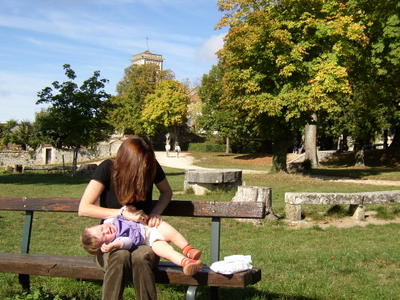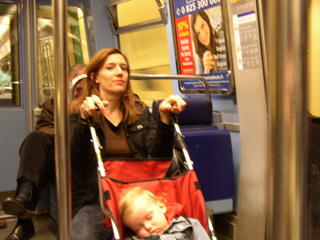The Onion had a nice little feature in their "American Voices" section in which they asked ordinary people on the street what they thought about Germany's appointment of a woman Chancellor.
One person responded something to the effect of: "you're trying to trick me into thinking I should care about German politics, aren't you?"
I can well understand that most Americans mostly don't care about European politics. Why should they? The only possible reason I can think of is that there are a few things Americans might actually learn from Germany. After all, in spite of its so-called "crisis" and the seemingly gloomy perspective of the people who live here (moi
not included), the country does a lot of things well. Germans are relatively prosperous. The cities are lively and attractive places to live. Health care is almost universal. The schools are excellent. The crime rate is low.
What I can't understand, however, are Americans who only pay attention to Germany (and the rest of Europe) when they feel that their country has been gravely insulted. "Davids Medienkritik" is an entire blog dedicated to exposing supposed examples of anti-American prejudice in the German media. David and friends believe that German papers caricature American politics, demean our culture, and belittle our sacrifices in the cause of international liberty. When they're not busy documenting German intolerance toward America, the bloggers are trashing the Germans' social system, mocking their slow rate of growth, and offering 1001 I-told-you-so's regarding Germany's collapsing economy.
And that's not the only blog of its kind. There are an amazing number of American sites out there whose subheadings could read: "arrogant, whimpy, crisis-plagued Europeans get what's coming to them." The weirdest thing about this phenomenon is that most of these American guys (and they seem to be all guys) live here in Europe.
No, wait, the WEIRDEST thing about this phenomenon is the bloggers' total lack of reflectiveness about the strengths and weakness of American society and their fanatical defensiveness. Blogger-David recently offered evidence of a rising rate of social security payouts in the US as proof that the US social system is superior to Germany's. One of the regular visitors to the site declared that poverty in America is 97% "transitional," and that it's good for people to be poor for a while: It's a learning experience. (Gosh, yes, I feel so deprived at not having had the chance to live in a housing project and get shot at for a couple years. This must explain my mediocre SAT scores.)
Of course there's lots more blah blah blah on these sites of the complex sort of our-widget-production-growth-graph is bigger than their-widget-production-growth-graph, which I won't pretend to have understood.
But I'd just like to know: When did we get so sensitive? What is at stake if a few German papers draw a moustache on Lady Liberty? Why does every American boy start plugging his ears with red, white, and blue silly putty every time someone criticizes his country or suggests, god forbid, that America might borrow a few good ideas from abroad?
Seems to me that there's a simple and seemingly obvious fact that is destined never to penetrate the blagosphere:
Dudes, in a number of very basic quality of life measurements, we (America) suck, and they (Germans) rule.
The bloggers like to mock the paternalistic and costly elements of the European welfare state. But the mother of all welfare programs is the prison system. That's where mostly poor and poorly educated folks are housed for years and years, with every single aspect of life taken care of by the state. In the USA, the annual cost per prisoner is comparable to an overseas cruise. The food, however, is significantly worse, and you don't get to hear the likes of Tony Orlando and Dawn each night after dinner.
In 2003, there were well over 2 million people incarcerated in the United States. That's a ratio of 715 prisoners for every 100,000 people. If all the prisoners in America were put in a city, it would be the 4th largest city in the country, right between Chicago and Houston.
In Germany, in 2003 there were 79,153 prisoners. That's smaller than Bielefeld. It's not even Evanston, Illinois. That's a ratio of 96 prisoners per 100,000 people.
Even if we could agree with our neanderthal friends that every one of these American prisoners deserves to be incarcerated, it would still raise the question of why such an extraordinary number of Americans have become so anti-social that they have to be put behind concrete and barbed wire and guarded around the clock.
And don't start thinking that the great prison boom has made America safer than Germany. No. Not even close.
Leave the prisoners out of the statistics (which is of course what almost all quality of life statisticians DO) and any honest comparative analysis still has the US looking bad.
Regarding infant mortality, the poverty rate, adult health and wellness, education: USA lose, Germany win. A recent Harris poll that was, of course, trumpeted by the all-American blog consortium indicated that Americans are far more optimistic about the future. Germans, in fact, were the most pessimistic people on the list of countries. But even that factoid, while interesting, is hard to square with another fact of life (and death):
Suicide rate among 15-24 year olds
USA: 13.7 per 100,000 people
Germany: 4.7 per 100,000 people
And that's in spite of the fact that Germans are prescribed significantly fewer anti-depressants and use far less meth, pot, crack, and cocaine (the anti-depressants of choice in many American cities).
On the other hand, they do drink more alcohol. But the beer is so good.....











